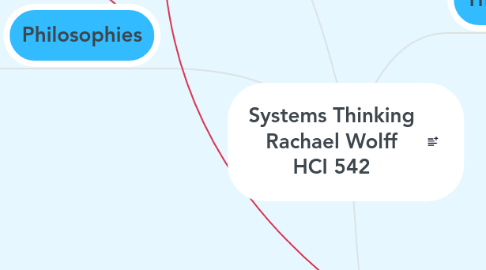Systems Thinking Rachael Wolff HCI 542
Rachael Wolffにより


1. Philosophies
1.1. Individualism
1.1.1. Separate from environments
1.2. Emergentism
1.2.1. System as a whole
1.3. Organicism
1.3.1. Irreplaceable elements
1.4. Structuralism
1.5. Holism
1.5.1. More than the sum of their parts
2. Healthcare
2.1. Services
2.2. Patient Care
2.3. Treatment
2.4. Outcome
2.5. Research
3. References
3.1. Acaroglu, L. (2018, October 31). Results-Based Protection. Retrieved January 14, 2021, from Article: Tools for Systems Thinkers: The 6 Fundamental Concepts of Systems Thinking | Results-Based Protection
3.2. Meadows, D. H., & Wright, D. (2008). Thinking in systems: A primer. White River Junction, VT: Chelsea Green Publishing.s
3.3. Laszlo, E. (2002). The systems view of the world: A holistic vision for our time. Cresskill, NJ: Hampton Press.
3.4. Monat, J. P., & Gannon, T. F. (2015). What is Systems Thinking? A Review of Selected Literature Plus Recommendations. Retrieved January 24, 2021, from https://static1.squarespace.com/static/5cdd9b229d414959afa69898/t/5f0c56adb35453569b65c2f6/1594644145160/What+is+Systems+Thinking+A+Review+of+Selected.pdf
4. Theories
4.1. Systems Dynamics
4.1.1. Holistic perspective
4.2. 5th Discipline
4.3. Complexity Science
4.4. General Systems Thinking
4.4.1. Perspective
4.4.2. Language
4.4.3. Set of tools
5. Cultural Shift
5.1. Systems thinking
5.1.1. Interconnected
5.1.2. Causality
5.1.3. Emergence
5.1.4. Feedback Loops
5.1.5. Synthesis
5.1.6. Systems Mapping

